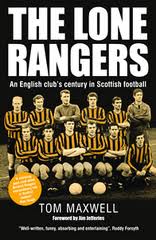Book Review: The Fabulous Baker Boys: The Greatest Strikers Scotland Never Had by Tom Maxwell
 When England manager Roy Hodgson recently suggested that he would be monitoring the progress of Manchester United’s Belgian youngster Adnan Januzaj, the issue of international player eligibility was once more in the news.
When England manager Roy Hodgson recently suggested that he would be monitoring the progress of Manchester United’s Belgian youngster Adnan Januzaj, the issue of international player eligibility was once more in the news.
Nowadays in this country, supporters are used to seeing players born in different countries turning out for England whether it is football, cricket, rugby league or rugby union. However, the rules governing eligibility have not always been as they are now and this issue is central to the latest book by Tom Maxwell, ‘The Fabulous Baker Boys: The Greatest Strikers Scotland Never Had’.
In 1938, George and Lizzie Baker were living in New York and on 11 April that year their first child Gerry Austin Baker was born. However, when the Second World War broke out in September 1939, the family returned to England to settle in Liverpool, where in July 1940, Joseph Henry Baker was born. Merseyside wasn’t to remain home for long, as the Germans blitzed the port area of Liverpool. Six weeks after Joe was born, Lizzie took the young boys to Wishaw near Motherwell and this was where the family settled and grew up.
Both boys were talented young players and in 1955 Gerry made his debut for Chelsea in the Southern Professional Floodlit Cup. In the same year, Joe played for Scotland Schoolboys playing against England and Wales. However, from this point the path the brothers journeyed on was not as might have been predicted.
Joe was never to pull on the blue shirt of Scotland after 1955 and instead because of the place of his birth, it was ruled he could only play international football for England. So it was that Joe went on to make 5 appearances (scoring 4 goals) for the Under 23s and gained 8 full caps (scoring 3 goals). Indeed Joe played in the opening England game in January 1966, although ultimately he was destined not to be part of the World Cup squad.
In terms of his club career, Joe was widely regarded wherever he played. He started his professional career with Hibernian and in four seasons, amassed 141 goals. This lead to a single season stint at Torino, where he was seriously injured in a car crash, in which Dennis Law was also involved. Baker returned to England and had an impressive four season stay at Arsenal where Joe scored 100 goals. However, partway through his last season at Highbury (1965/66) he moved onto Nottingham Forest and stayed at the City Ground until 1968/69. His tally of 49 goals might not have been as prolific as his returns at his other clubs, but Joe became something of a cult figure down by the Trent. With Joe approaching his 30th birthday he moved to Sunderland for the 1969/70 season as his career started to wind down. The following season he returned to Scotland and Hibernian, finally retiring from playing in 1973/74 after a two season stint at Raith Rovers. Joe’s record makes incredible reading, as from 615 club appearances he scored 372 goals – an outstanding return.
Brother Gerry never settled at Chelsea and returned to Motherwell. However, he found opportunities difficult to come by and he moved to St. Mirren scoring an impressive 66 goals in 81 games. His exploits attracted clubs in England and Gerry had a two season spell at Manchester City before returning to Scotland and Hibernian in 1961/62, just as Joe left the club. However in 1963/64, Gerry left Easter Road and once more moved ‘south of the border’ to help Ipswich Town gain promotion from Division Two, enjoying a productive spell at Portman Road, before moving to Coventry City. It was whilst at the Sky Blues that Gerry gained international honours for the USA. He played in 7 games for the land of his birth, scoring twice and was part of the side that fell short of qualifying for the 1970 World Cup Finals in Mexico. Gerry ended his professional career at Brentford in the 1969/70 season before playing for Margate (as player-manager), Nuneaton Borough, Bedworth United and Worcester City. Gerry’s club career saw him score a highly impressive 201 goals from 409 games.
Writer Tom Maxwell tells the story of their respective remarkable careers in an engaging and intimate way. The excellent research and quotes from the brothers and players of the era, means this book is a personal yet interesting insight into football during the 1950s and 60s both in Scotland and England.
But for the eligibility rules of the late 1950s, Scotland would have had a very different international forward line.
Between them, 1,024 appearances, 573 goals – ‘the Fabulous Baker Boys’ indeed.
